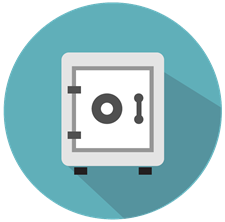Article summary: A savings account is more than a safe place to hold your money. It can give you peace of mind, help you work toward a financial goal, and build good money habits.
A savings account can be a safe, convenient way to build your financial future. You can use a savings account to save money for a financial goal, prepare for an emergency, build healthy financial habits, and more. And with a savings account, your money is readily available to you if you need it.
A savings account is a good way to set aside money but still be able to access it quickly if you need to, such as in an emergency. It’s an important tool, in addition to using a checking account for everyday spending. Here are a few other reasons to consider a savings account:
WHY OPEN A savings account?

- It can be safer than cash. Keeping or carrying around a lot of cash can be risky. Cash can be lost, stolen, or damaged — and once it’s gone, it’s gone.
- Your money is protected. Most banks are insured by the Federal Deposit Insurance Corporation (FDIC), so if something happens to the bank, your money won’t just disappear. You’re insured for up to $250,000 per depositor, per FDIC-insured bank, per ownership category .
- It can help you avoid overdraft fees. Your bank might offer the option to connect your checking and savings accounts to cover overdrafts. That means if you spend more than you have available in your checking account, the bank can use funds from your savings account to cover the shortage. There might be a fee for this service, but it’s typically less than overdraft fees.
- You’ll earn interest. Unlike money in most checking accounts, money in a savings account earns interest. The longer you keep the money in the account, the more interest it earns.
how do savings accounts work?
When you deposit money into a savings account, you’re basically putting it in a safe place (your bank) until you need it. And even if you’re using the account to save toward a specific goal, you can still access the cash at any time for short-term needs. That’s why savings accounts can be a good way to build an emergency fund.
The bank pays you a small amount of money, called interest, just for keeping your money there. Keep in mind, however, that the interest rate on a savings account is usually low. If you’re working toward a long-term financial goal, like buying a house or paying your child’s college tuition, there may be other types of accounts that earn more interest, helping you grow your money more over time. [1]
Some banks also have minimum balance requirements, account maintenance fees, or limits on the number of withdrawals you can make before facing a fee. Be sure to ask your bank about any restrictions or fees when you open the account.
WHAT IS THE FDIC?
Some people worry about trusting banks — what if something goes wrong? Would your money just disappear? Most banks are protected by the FDIC, which essentially insures your deposits. That means that if the bank fails, for example, you’ll still get your money back, up to the $250,000 limit mentioned above. (If you’re using a credit union, your deposit account is insured by the National Credit Union Administration, or NCAU.)
TYPES OF SAVINGS ACCOUNTS
There are several different types of savings accounts, all with different benefits and requirements. Here are a few of the more common options that pay varying levels of interest:
| How it works | The benefits | The drawbacks | |
| Traditional savings accounts | Similar to a checking account, you can put money in (make a deposit), take money out (make a withdrawal), and transfer money. | While the money is in your account, it will earn interest. The money is available for you to withdraw whenever you need to. Most banks are insured by the FDIC, so your money is protected. | The interest rate is usually low. To avoid fees or to keep the account open, you may need to keep a certain amount of money in the account, known as a minimum balance. Some banks limit the number of withdrawals you can make each month. |
| Money market accounts | As with a traditional savings account, you can make deposits and withdrawals and transfer money. | Unlike with a traditional savings account, you might receive checks that you can use to make withdrawals or purchases, as well as a debit card. Money market accounts generally have a higher interest rate. | There are restrictions on the number of withdrawals you can make using checks. These accounts also usually require a higher minimum balance. |
| Certificate of deposit (CD) | You are required to keep your money in the account for a set amount of time (term). | The interest is higher than a traditional savings or money market account. | If you withdraw your money before the term ends, you’ll need to pay a penalty. This could include giving up a portion of interest you’ve earned. |
| High-yield savings account | The interest rates on this type of savings account can be 10 to 12 times higher than traditional savings accounts. [2] | Your money can grow faster than it would in a traditional account, and it’s easily accessible if you need cash. These accounts also usually come with very few fees or additional costs. [3] | These are primarily offered by online banks, so you need to be comfortable banking online. Some also limit withdrawals or have high minimum balance requirements. |
Some banks also offer special programs like accounts for military members or students that have lower minimum requirements or allow more withdrawals per month, so it can be worth checking with your bank to see if you qualify as you’re determining what kind of account would work best for your needs.
how MUCH MONEY SHOULD I KEEP IN A savings account?
There’s not really a one-size-fits-all answer when determining how much money you should keep in your savings account. Every little bit adds up over time. If you’re building an emergency fund, the general recommendation is to save up enough to cover at least three to six months’ worth of living expenses — your rent, utilities, car payment, etc. This can also help you be prepared for emergencies, such as an unexpected medical bill or large home or car repairs. But if saving seems daunting, remember that the key is just to get started. Saving any amount is a good step. [4]
Remember, a traditional savings account is just one tool in your financial toolbox. If you’re saving for a specific purpose or if you already have enough money set aside for an emergency, consider choosing a tool like a high-yield savings account or a money market account, which offer higher interest rates, or a brokerage or investment account.
how TO OPEN A savings account [5]
Different banks have different requirements for opening accounts, so be sure to find out what you’ll need before you head to the bank. You may also need to make a minimum opening deposit to establish the account.
Banks are required by law to verify that you are who you say you are, to prevent fraud. They usually need three things: 1) your Social Security number or Taxpayer Identification Number, 2) a government-issued photo ID as proof identity, and 3) proof of address.
Banks may accept the following forms of ID:
- Driver’s license or state ID
- Passport
- U.S. military ID (Common Access Card or Uniformed Services ID)
- Permanent resident card, also called a green card or alien registration card
- Matricula Consular card
You should also bring proof of your current address, such as a rental agreement (lease), utility bill, or cell phone bill.
Specific requirements can vary from bank to bank. If you have questions, if you don’t have any of these forms of ID, or if you are not a U.S. citizen, call or visit a bank to find out their specific requirements.
A parent or legal guardian must accompany minors younger than 18 (19 in Nebraska). Those under 18 will need two forms of current identification, such as:
- Birth certificate
- Immunization record
- Student ID
- Social Security card
UNDERSTANDING INTEREST
There are two types of interest: simple and compound. Almost all savings accounts use compound interest, but understanding simple interest can help you easily estimate how much you’ll earn over time.
- Simple interest: This is a percentage of the amount of your original deposit. For example, if you put $1,000 into a savings account with an interest rate of 1%, you’d earn $10 in interest each year. With simple interest, you only earn on the account’s original principal, not on the amount that gets added due to interest. (So for that $1,000, you’d earn $10 every year.)
- Compound interest (most common for savings accounts): This means you earn interest on the principal balance and the interest it earns. The interest rate earned on an account in one year, including compound interest, is called the annual percentage yield (APY). If you put $1,000 into a savings account with an APY of 1%, you’d earn $10 in interest in the first year, and then interest on $1,010 (principal plus year one’s interest) in year two, and so on.
SOURCES
- Burnette, M. (August 28, 2025). What Is a Savings Account?
Kagan, J. (December 1, 2024). What Is a Savings Account and How Does It Work?
Shahid, M. (October 7, 2025). What Is A Savings Account And How Does It Work?
- Karl, S. (September 18, 2024). What Is a High-Yield Savings Account?
Knueven, L. (November 19, 2024). What is a High Yield Savings Account?
Ernst, K. (March 17, 2023). High-yield savings accounts vs. regular savings accounts: Which is better?
- Lake, R. (July 31, 2024). What Is A High-Yield Savings Account?
Akin, J. (November 4, 2023). High-Yield Savings Account vs. Traditional Savings Account
Rodriquez, A. (November 12, 2025). Pros and cons of a high-yield savings account
Zinn, D. (September 26, 2025). High-yield savings account vs. traditional savings account: What’s the difference?
Axelton, K. (January 17, 2024). 7 Reasons to Put Your Money in a High-Yield Savings Account
- Burnette, M. (August 28, 2025). How Much Should I Have in Savings?
Parker, T. (December 2, 2025). Optimal Cash Reserves: How Much to Keep in the Bank
Goldberg, M. (April 28, 2025). How much should you have in savings at each age?
Gravier, E. (October 24, 2024). How much cash should you keep in your savings and checking account? A financial planner weighs in
- Bennett, K. (August 26, 2025). How to open a savings account: 5 steps to take
Burnette, M. (November 24, 2025). How to Open a Savings Account: Step by Step
- Kopp, C. (October 14, 2025). Understanding Savings Account Interest and the Power of Compounding
Axelton, K. (October 9, 2023). How Does Interest Work on a Savings Account?
Want to learn more about modern banking and ways to manage your money? Discover more here:


